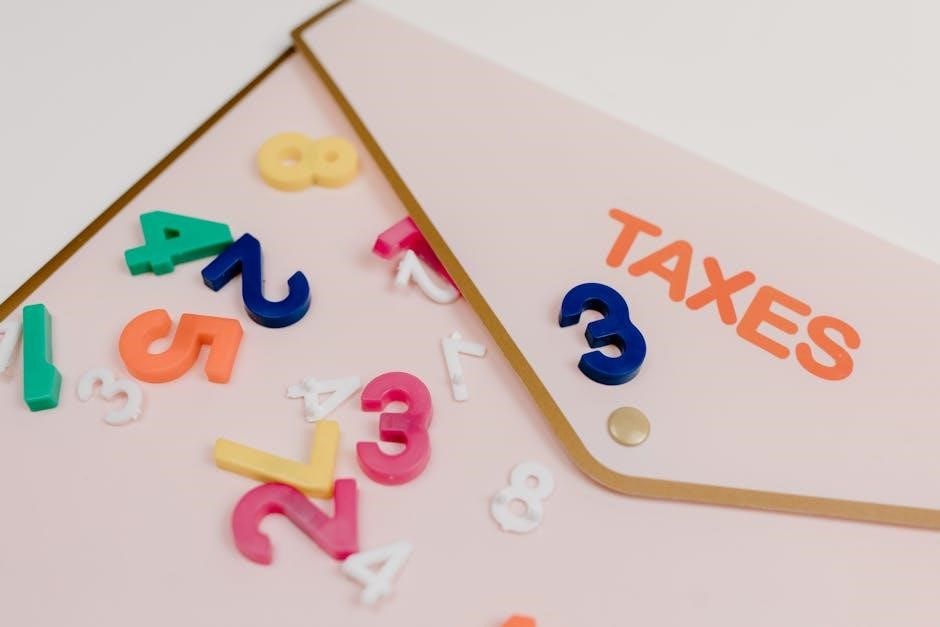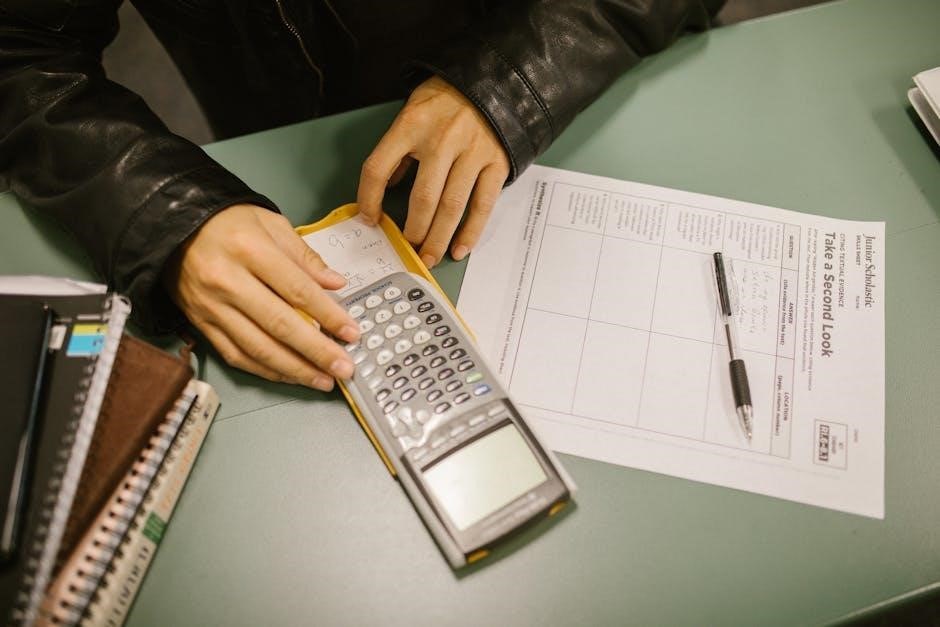The Year 3 Maths Assessment PDF is a comprehensive resource designed to evaluate students’ mathematical skills, offering detailed questions and guidance for teachers and parents.
1.1 Overview of the Assessment
The Year 3 Maths Assessment PDF is a structured evaluation tool designed to measure students’ understanding of key mathematical concepts. It aligns with the curriculum, covering topics like multiplication, division, and basic geometry. The assessment includes a variety of question types, such as multiple-choice and open-ended problems, to evaluate both procedural fluency and problem-solving skills. The PDF format ensures accessibility and ease of use for teachers, parents, and students. It also provides clear instructions and examples to guide students through the test. By identifying strengths and areas for improvement, the assessment helps tailor learning strategies and ensures students are well-prepared for future academic challenges.
1.2 Importance of Year 3 Maths Assessment
The Year 3 Maths Assessment PDF plays a crucial role in evaluating students’ mathematical understanding and readiness for higher-level concepts. It helps identify learning gaps, ensuring timely intervention and support. By aligning with curriculum standards, the assessment provides a clear measure of progress, enabling teachers to tailor instruction to meet individual needs. Additionally, it fosters problem-solving skills, critical thinking, and mathematical fluency, which are essential for academic success. Parents and educators can use the results to track development and provide targeted practice, ultimately preparing students for future challenges in mathematics and related fields. This assessment is a valuable tool for guiding personalized learning and fostering long-term academic growth.

Year 3 Maths Curriculum Overview
The Year 3 maths curriculum focuses on building foundational skills in arithmetic, geometry, and data handling, with an emphasis on problem-solving and real-world mathematical applications.
2.1 Key Topics Covered in Year 3 Maths
In Year 3 maths, students explore essential topics such as number operations, including multiplication, division, and mental maths strategies. They also learn about geometry, focusing on shapes, symmetry, and basic measurements. Data handling is introduced, where pupils create and interpret simple graphs. Additionally, the curriculum emphasizes word problems, requiring students to apply mathematical reasoning to real-life scenarios. These topics are designed to build a strong foundation for future maths studies, ensuring students develop problem-solving skills and mathematical fluency.
2;2 Skills Assessed in the Year 3 Maths Assessment
The Year 3 Maths Assessment evaluates students’ ability to apply mathematical concepts to solve problems. Key skills include number sense, such as understanding place value and performing mental calculations. Students are also assessed on their problem-solving abilities, requiring logical reasoning and step-by-step methods. Additionally, the assessment tests communication skills, as students must explain their thinking and justify answers. Lastly, their ability to apply maths to real-life scenarios is evaluated, ensuring practical understanding. This comprehensive approach helps identify strengths and areas needing improvement, guiding future instruction effectively.

Structure of the Year 3 Maths Assessment PDF
The Year 3 Maths Assessment PDF is organized into clear sections, including multiple-choice questions, word problems, and practical examples, with an answer key and scoring guide.
3.1 Format of the Assessment
The Year 3 Maths Assessment PDF follows a structured format designed to evaluate students’ understanding of key mathematical concepts. It typically includes multiple-choice questions, word problems, and practical examples. The assessment is divided into clear sections, each focusing on specific skills such as arithmetic, problem-solving, and logical reasoning. Instructions are provided at the beginning of each section to guide students. The questions are arranged in order of difficulty, starting with basic concepts and progressing to more complex tasks. Visual aids, such as diagrams and charts, are often included to support comprehension. The format ensures consistency, making it easier for teachers and parents to assess and track student progress effectively.
3.2 Types of Questions Included
The Year 3 Maths Assessment PDF incorporates a variety of question types to cater to different learning styles and skill levels. Multiple-choice questions are included to test quick recall of facts and basic concepts. Word problems encourage students to apply mathematical knowledge to real-world scenarios, enhancing problem-solving skills. Practical examples and visual aids, such as diagrams and charts, are used to support understanding of more complex topics. Open-ended questions allow students to demonstrate their reasoning and critical thinking abilities. The mix of question types ensures a comprehensive evaluation of mathematical proficiency, making the assessment both engaging and effective for identifying strengths and areas for improvement.
Preparing for the Year 3 Maths Assessment
Regular practice, consistency, and understanding of key concepts are essential for success. Utilize practice materials and seek guidance from teachers and parents to build confidence effectively.
4.1 Study Tips for Students
To excel in the Year 3 Maths Assessment, students should adopt a structured study routine. Start by identifying areas of difficulty and focus on improving those topics. Regular practice with past papers and online resources helps build familiarity with question formats. Encourage active learning by solving problems aloud and explaining solutions to others. Using visual aids like charts and diagrams can enhance understanding. Additionally, maintaining a positive mindset and taking regular breaks prevents burnout. Parents and teachers can support by providing constructive feedback and creating a conducive study environment. Consistent effort and gradual progress are key to achieving success in the assessment.
4.2 Role of Parents in Preparation
Parents play a vital role in preparing students for the Year 3 Maths Assessment. Encouraging daily practice and creating a dedicated study space fosters a productive environment. Reviewing assessment guidelines with teachers ensures alignment with curriculum goals. Parents can provide emotional support by discussing progress and offering positive reinforcement. Utilizing recommended resources, such as practice materials, enhances learning. Regular communication with educators helps identify strengths and areas needing improvement. By actively engaging in their child’s preparation, parents contribute significantly to building confidence and readiness for the assessment. This collaborative effort between home and school is essential for a successful outcome.
Using the Year 3 Maths Assessment PDF Effectively
The Year 3 Maths Assessment PDF is a valuable tool for understanding and improving mathematical skills. It provides clear guidance, enabling students and educators to navigate effectively.
5.1 Navigating the Assessment Document
Navigating the Year 3 Maths Assessment PDF is straightforward due to its structured format. The document begins with a clear table of contents, allowing users to easily locate specific sections. Each page is numbered, and key sections are highlighted with bold headings. The assessment is divided into logical parts, such as multiple-choice questions, short-answer problems, and word-based tasks. Visual aids like diagrams and charts are included where necessary to support understanding. A glossary of terms is often provided at the end to clarify mathematical vocabulary. This organized layout ensures that both students and educators can follow the assessment seamlessly, making it an efficient tool for evaluating mathematical proficiency.
5.2 Interpreting Results and Feedback
Interpreting results from the Year 3 Maths Assessment PDF involves analyzing scores and understanding performance metrics. The assessment provides raw scores, percentages, and comparisons to benchmarks. Feedback sections highlight strengths and areas needing improvement, often with explanations for correct and incorrect answers. Teachers and parents can identify specific skills where students excel or struggle, such as multiplication or geometry. Detailed breakdowns enable targeted support, ensuring learning gaps are addressed. Students can review their answers to understand mistakes and improve. This comprehensive feedback loop fosters growth and helps tailor future learning strategies effectively, making the assessment a valuable tool for progress tracking and skill development. Regular review of feedback enhances overall mathematical proficiency.
Common Challenges in Year 3 Maths Assessment

Students often struggle with word problems, applying concepts to real-life scenarios, and mental maths. Time management and accuracy are common issues, along with understanding abstract mathematical concepts.
6.1 Identifying Areas of Difficulty
Identifying areas of difficulty in Year 3 maths assessments involves analyzing student performance across various topics. Common challenges include mastering multiplication tables, understanding fractions, and solving word problems. Many students struggle with applying mathematical concepts to real-world scenarios, while others face difficulties with mental maths and time management during tests. Additionally, some pupils may find it hard to grasp abstract ideas, such as place value or reversing operations, which are foundational for more complex maths skills. Teachers and parents can pinpoint these areas by reviewing assessment results, observing learning gaps, and providing targeted support to address these challenges effectively.
6.2 Strategies to Overcome Common Mistakes
To address common mistakes in Year 3 maths assessments, teachers and parents can implement targeted strategies. Breaking down problems into smaller, manageable steps helps students grasp concepts more effectively. Encouraging the use of visual aids, such as diagrams or manipulatives, can clarify abstract ideas. Regular practice with worksheets or online tools reinforces learning and builds confidence. Providing immediate feedback on errors allows students to understand and correct their mistakes promptly. Additionally, fostering a growth mindset and promoting peer support can reduce anxiety and encourage collaborative problem-solving. Tailored resources and positive reinforcement further enhance learning outcomes, ensuring students overcome challenges and excel in their maths journey.

Resources and Tools for Year 3 Maths Assessment
Utilize practice books, interactive websites, and educational apps to support learning. These resources offer engaging activities and real-time feedback to enhance maths skills effectively for Year 3 students.
7.1 Recommended Practice Materials
Recommended practice materials for Year 3 Maths Assessment include worksheets, past papers, and activity books. These resources are designed to reinforce key topics like arithmetic, geometry, and problem-solving. Many materials align with curriculum standards, ensuring relevance and effectiveness. Parents and teachers can use these tools to identify learning gaps and track progress over time. Interactive worksheets and puzzles also make learning engaging for students. Online platforms offer additional support, such as downloadable PDFs and video tutorials. Utilizing these resources regularly helps students build confidence and fluency in maths. They are ideal for both classroom and home learning environments.
7.2 Online Platforms for Additional Support
Several online platforms offer additional support for Year 3 Maths Assessment preparation. Khan Academy provides free maths resources, including video tutorials and practice exercises. Coolmath Games makes learning interactive with maths-based games. IXL offers comprehensive practice questions aligned with curriculum standards. Math Playground features problem-solving activities and puzzles to enhance critical thinking. BBC Bitesize provides structured lessons and quizzes tailored for Year 3 students. These platforms cater to different learning styles, ensuring students can grasp concepts through engaging methods. Regular use of these tools helps build confidence and improve problem-solving skills, making maths more accessible and enjoyable for young learners.
